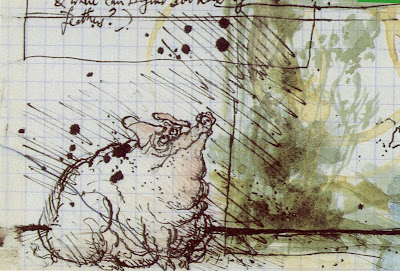 |
| Ronald Searle |
Oil mogul
Armand Hammer amassed a large collection of paintings by famous artists. He then decided to build a $70 million museum to house his collection. The Armand Hammer Museum would be a grand monument to Hammer and his taste.
Some were startled to learn that despite his personal fortune of hundreds of millions of dollars, Hammer expected the shareholders of the Occidental Petroleum Company to pay for his museum. But when shareholders sued to block Hammer from using company funds, they were even more startled to discover that he had already spent millions of dollars of shareholder money to buy art for his personal collection. Those millions of dollars were taken from the retirement funds of teachers, waiters and shop clerks to buy more art for Hammer.
 |
| C. F. Payne |
 |
| Sullivant |
Dennis Kozlowski, the former CEO of Tyco International, acquired a personal fortune of approximately $600 million. Before he was convicted for plundering money from his company, he
set out to acquire a major art collection (Monet, Renoir, etc.) with the assistance of a Palm beach art consultant. Kozlowski apparently became a fan of Michelangelo in the process because he commissioned an ice sculpture of Michelangelo's
David that urinated Stolichnaya vodka into the crystal glasses of guests who he flew to
his wife's $2 million birthday party on the island of Sardinia.
During Kozlowski's last major art purchase, he falsified the paperwork to avoid paying tax on $14 million worth of art, and ended up being indicted for tax evasion.
 |
| Ronald Searle |
 |
| Robert Fawcett |
Richard Fuld, former CEO of the investment firm Lehman Brothers, led his company into the treacherous subprime loan market. They made billions by scooping up toxic debt and passing it off on clueless investors who trusted Lehman. This played a major role in triggering the recent global financial meltdown and wrecking countless lives. Fuld himself pocketed half a billion dollars before Lehman Brothers finally went bankrupt.
Why did Fuld need that much money so badly? What made it all worthwhile? For one thing, Fuld was able to acquire a major art collection worth tens of millions of dollars, including works by abstract expressionists such as de Kooning. Bonus: his wife got to sit on the board of the Museum of Modern Art.
 |
| Garth Williams |
A
recent report on the intrinsic benefits of the arts found that the arts are responsible for
growth in individual capacities—such as enhanced empathy for other people and cultures, powers of observation, and understanding of the world—that can occur through cumulative arts experiences. These intrinsic effects enrich individual lives, but they also have a public spillover component in that they cultivate the kinds of citizens desired in a pluralistic society.















Post a Comment